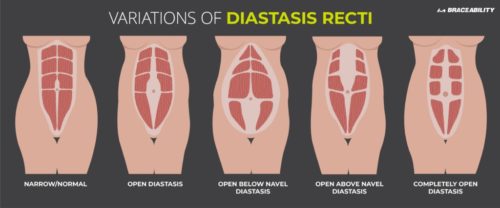You may already know this, but your abs naturally expand and separate when you are pregnant. Makes sense right? After birth, some women are left with a condition called diastasis recti, where the abdominal separation did not heal and they are left with a gap in their abdominal wall. Specifically, abdominal separation of 2cm or more is called diastasis recti. Whether you gave birth years ago or recently became postpartum, this post is for you because you could have it.

Recently, I found out I have diastasis recti and my daughter is almost two-years-old. It’s slightly embarrassing to admit that; not because I have diastasis recti, but because I did not know until 21 months postpartum.
To be honest, I did not know what diastasis recti was until months ago when I was researching the “c-section” pooch and happened to stumble across it. I have been working out vigorously for the past nine months, but my abs have remained weak and unchanging. I’m still left with a pooch, which I attributed to my pregnancy (I had a 10lber) and c-section birth. I thought it was just something I was going to have to live with.
However, within the last month or so I have been challenging myself to do more ab work. Although it was uncomfortable, I just assumed it was because my abs were still weak since I have not been focusing on my core. I continued to add more abdominal work to my routine. Over time, I knew my abs would become stronger. Well, one day I was working out in just a sports bra. When I performed a sit-up, I noticed my stomach bulging into a weird shape. I knew that wasn’t right.
I completed diastasis recti check on myself.
Turns out, I could not feel my abdominal muscle on part of my abs. I was in denial that I had it before, but my stomach looked so odd I could not brush it aside. I knew there had to be something off, so I made a doctor’s appointment. Before my scheduled appointment, I attended a women’s health seminar at Benchmark Physical Therapy. Not only did I learn about how common diastasis recti is for postpartum women, but also about other postpartum issues like prolapse, incontinence, and sexual discomfort. Simple exercises were demonstrated to help prevent and heal these issues like kegels, deep breathing, and stretches. The purpose of this seminar was to get the message out about postpartum women’s issues being NORMAL because no one talks about them.
Want to talk about your child not sleeping through the night or throwing a toddler terror tantrum? Normal! Someone talking about peeing on herself after coughing? Nope — you won’t be hearing that convo at a park playdate. When I started asking other moms about diastasis recti, most of them had NEVER even heard of it.
Oftentimes postpartum women are never informed of the postpartum issues they could experience or even checked for conditions at follow-up appointments. When the seminar concluded, the physical therapist checked whoever wanted to know if they had DR or not. Turns out, most of us had it and not one of us had ever been checked for it before. I’m glad that I now know, so I can start fixing the problem; however, it really stinks that I could have hurt myself if this problem had continued (I could have developed other issues like a hernia, pelvic floor dysfunction, pelvic and back pain).
 If you are interested to learn more about diastasis recti, check out here, here, and here. If you want to check yourself, follow along with this guide. Along with the check, ask yourself: Are you left with a pregnant-like pooch? Do you have lower back pain? Experiencing incontinence?
If you are interested to learn more about diastasis recti, check out here, here, and here. If you want to check yourself, follow along with this guide. Along with the check, ask yourself: Are you left with a pregnant-like pooch? Do you have lower back pain? Experiencing incontinence?
If you believe you do have diastasis recti, please follow-up with your physician to see what exercises to do, if you need to be referred to a physical therapist, or possibly surgery. Please be cautious of exercises and articles you read online about correcting DR, since not all information is correct. Performing certain exercises actually worsen your condition.


















